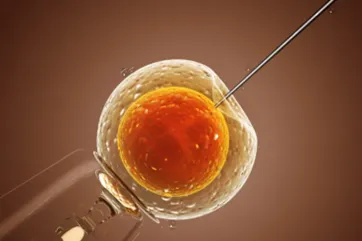Intracytoplasmic Sperm Injection (ICSI)
A specialized form of In Vitro Fertilization (IVF) called Intracytoplasmic sperm injection (ICSI) is a procedure wherein fertilisation is achieved by injecting a sperm is directly injected into a single egg’s cytoplasm using micromanipulation under a microscope.
Steps of Intracytoplasmic Sperm Injection ICSI:
Sperm and Egg Collection: Sperm and mature eggs are collected from the individuals.
Micromanipulation: A single, healthy sperm is selected with the use of a high-powered microscope and extremely fine tools.

Intracytoplasmic Sperm Injection (ICSI)
Injection: The selected sperm is then directly injected into the cytoplasm (the inner substance) of the egg.
Embryo Culture and Transfer: The fertilized egg (embryo) is cultured in a lab for a few days to developed to a specific stage before being transferred into the woman’s uterus.
When is ICSI Used:
- Severe Male Infertility: This includes conditions like, low sperm count (oligospermia), poor sperm motility (asthenozoospermia), or abnormal sperm shape (teratozoospermia).
- Previous IVF Failures: When traditional IVF has failed achieve desired results in fertilization.
- Surgically Retrieved Sperm: When sperm needs to be obtained directly from the testicle via puncture or biopsy.
- Cryopreserved Oocytes: It is also used to fertilize eggs that have been frozen and thawed.
- Other Indications: Cases involving anti-sperm antibodies, low egg counts, or for genetic testing (preimplantation genetic diagnosis).
Meet Our Doctor

Dr. Shivani Chandan L
Accomplished Gynaecologist and Laparoscopic Surgeon
